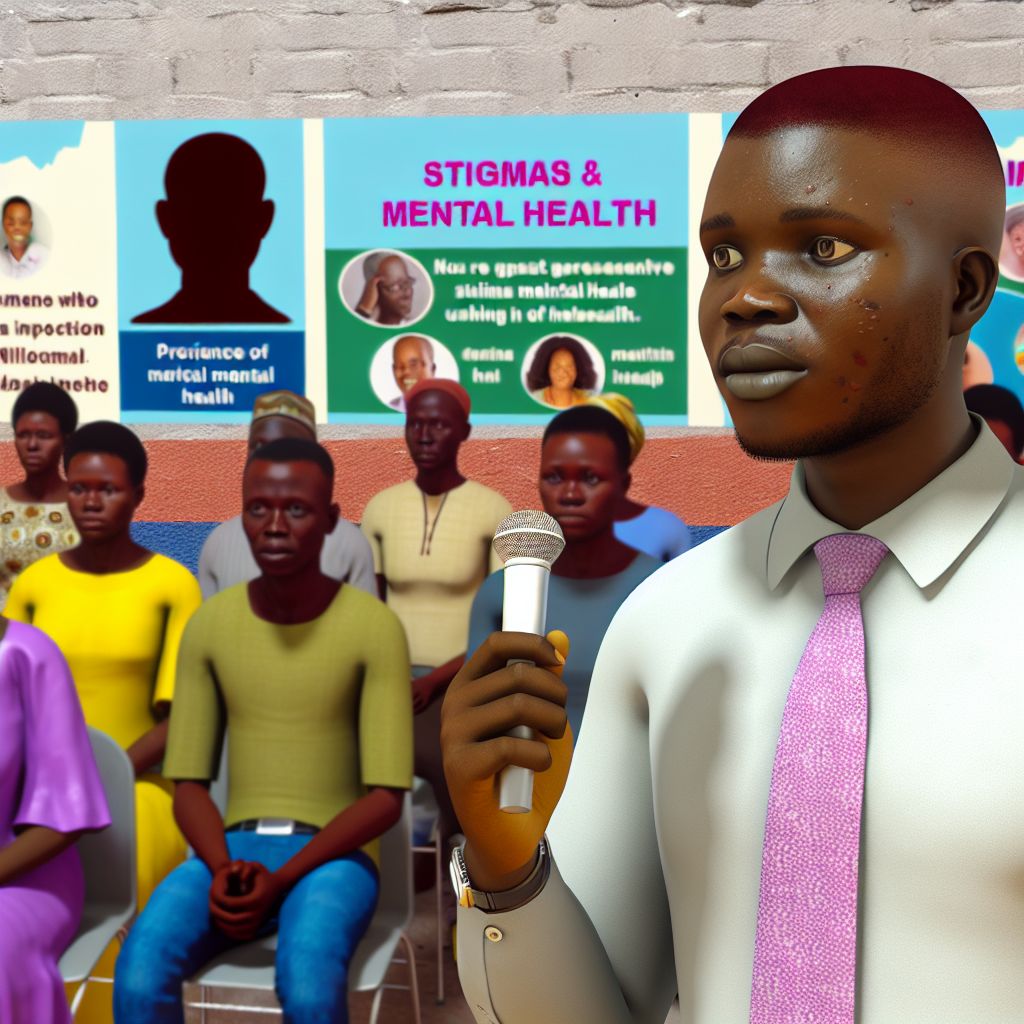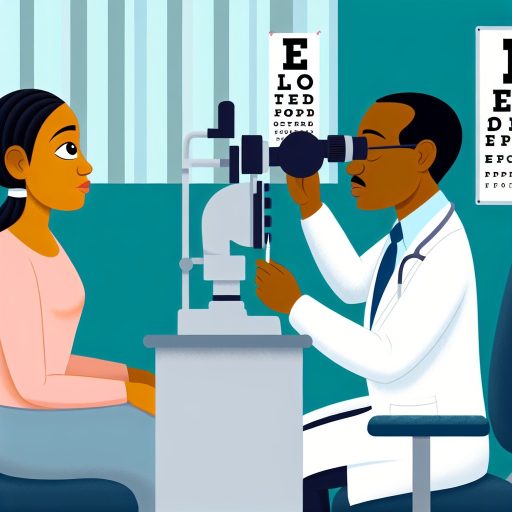Introduction:
Briefly introducing the topic of mental health stigma in Nigerian society.
Mental health stigma refers to the negative attitudes and beliefs that society holds towards individuals with mental health conditions.
This stigma can lead to discrimination, prejudice, and social exclusion.
Impact of Stigma:
The impact of mental health stigma on individuals in Nigerian society is profound.
It can prevent people from seeking help, leading to untreated mental health conditions.
Stigma also contributes to feelings of shame, isolation, and low self-esteem among those affected.
Barriers to Treatment:
Stigma creates significant barriers to accessing mental health treatment in Nigeria.
Many individuals fear being judged or misunderstood by their community, so they avoid disclosing their struggles or seeking professional help.
This reluctance can worsen their mental health and hinder recovery.
Cultural Beliefs:
Cultural beliefs in Nigeria can perpetuate mental health stigma.
Some communities view mental illness as a spiritual affliction or a sign of weakness, leading to further discrimination and ostracism of individuals with mental health conditions.
Education and Awareness:
Addressing mental health stigma in Nigerian society requires education and awareness campaigns to dispel myths and misconceptions.
By promoting understanding and empathy, the stigma surrounding mental health can gradually be reduced, encouraging more individuals to seek help and support.
Next Steps for Change:
In addressing mental health stigma, it is essential to involve community leaders and influencers.
Additionally, integrating mental health education into schools and workplaces can foster a more accepting environment.
Conclusion:
Mental health stigma in Nigerian society has a detrimental impact on individuals, preventing them from seeking treatment and support.
Addressing stigma through education and awareness is crucial to improving mental health outcomes and fostering a more inclusive and supportive society.
Historical Context of Mental Health Stigma in Nigeria:
Historical background of mental health in Nigeria dates back to pre-colonial times.
Traditional beliefs viewed mental illness as a result of spiritual possession or punishment.
Societal norms dictated that mental health issues should be kept hidden due to shame.
Colonial influence introduced Western medical perspectives but stigma persisted.
Post-independence, mental health services remained scarce, perpetuating stigma.
Religious beliefs also played a role, often attributing mental illness to demonic influences.
Factors Contributing to Mental Health Stigma in Nigeria:
Explore the cultural beliefs and superstitions surrounding mental illness in Nigeria.
In Nigeria, mental illness is often seen as a curse or spiritual attack, leading to stigmatization.
People believe that mental health issues are a result of evil spirits or ancestral curses.
This belief system perpetuates fear, shame, and discrimination towards individuals struggling with mental health.
Discuss the lack of mental health education and awareness in the country.
There is a general lack of understanding about mental health disorders in Nigerian society.
Due to this lack of education, many people do not recognize or seek help for mental health issues.
The absence of adequate mental health resources and facilities further contributes to the stigma.
Examine the role of religion and spirituality in perpetuating stigma around mental health.
Religion plays a significant role in shaping attitudes towards mental health in Nigeria.
Some religious leaders may perceive mental illness as a lack of faith or possession by evil spirits.
This can prevent individuals from seeking professional help and instead rely solely on spiritual interventions.
The stigma attached to mental health within religious communities can lead to social exclusion and isolation.
The combination of cultural beliefs, lack of education, and religious influences creates a complex environment that perpetuates stigma around mental health in Nigerian society.
It is crucial to address these factors through education, awareness campaigns, and destigmatization efforts to create a more supportive and accepting society for individuals living with mental health issues.
See Related Content: Childhood Immunization Schedule in Nigeria
Effects of Mental Health Stigma on Individuals:
Transform Your Career with Expert Guidance
Get personalized mentorship consulting that’s tailored to your unique path. Our expert advice is actionable and exclusive.
Get Started- Analyze the impact of stigma on individuals living with mental illness.
- Discuss the barriers to seeking help and treatment due to stigma.
- Highlight the negative consequences of untreated mental health conditions in Nigerian society.
Living with a mental health condition is challenging, and the stigma attached to it in Nigerian society exacerbates the difficulties faced by individuals.
The impact of mental health stigma on individuals is profound and can have lasting effects on their well-being.
Analyze the Impact of Stigma on Individuals Living with Mental Illness
Individuals living with mental illness often face discrimination, prejudice, and stereotypes due to the stigma surrounding mental health in Nigerian society.
This stigma can lead to feelings of shame, isolation, and low self-esteem, making it difficult for these individuals to seek help and support.
Moreover, the fear of being judged or stigmatized by others prevents individuals from disclosing their mental health condition and seeking appropriate treatment.
This can result in the worsening of their symptoms and overall deterioration of their mental health.
Discuss the Barriers to Seeking Help and Treatment Due to Stigma
Stigma creates significant barriers to accessing mental health services in Nigeria.
Individuals living with mental health conditions may avoid seeking help due to the fear of being labeled as “crazy” or “weak” by their community and loved ones.
Furthermore, the lack of awareness and education about mental health issues perpetuates the stigmatization of mental illness, leading individuals to suffer in silence rather than reaching out for professional help.
Highlight the Negative Consequences of Untreated Mental Health Conditions in Nigerian Society
The negative consequences of untreated mental health conditions in Nigerian society are far-reaching.
Individuals who do not receive proper treatment and support may experience a decline in their overall quality of life, including their ability to work, maintain relationships, and participate in daily activities.
Moreover, untreated mental health conditions can lead to severe outcomes such as self-harm, substance abuse, and even suicide.
The societal impact of untreated mental health conditions includes increased healthcare costs, reduced productivity, and strained social services.
See Related Content: Preventive Dentistry for Seniors in Nigeria
Efforts to Combat Mental Health Stigma in Nigeria:
Highlighting initiatives and campaigns aimed at raising awareness and reducing stigma around mental health is crucial in Nigeria.
These efforts play a vital role in breaking down barriers and promoting acceptance of individuals with mental health conditions.
Mental Health Advocacy:
Mental health advocacy is essential in destigmatizing mental health in Nigeria.
Advocacy efforts help to educate the public, challenge misconceptions, and ensure that those in need receive the support they deserve.
Importance of Mental Health Advocacy:
Mental health advocacy plays a critical role in shaping policies, promoting mental health care services, and pushing for the integration of mental health into primary healthcare.
Advocates work tirelessly to amplify the voices of those affected by mental health conditions.
Success Stories of Individuals and Organizations:
- An organization called Mentally Aware Nigeria Initiative (MANI) has been at the forefront of mental health advocacy in Nigeria.
- They have spearheaded various campaigns and projects aimed at raising awareness and reducing stigma.
- One success story is that of a young woman who courageously shared her journey of living with depression.
- Her story inspired many others to seek help and speak up about their struggles.
- Another organization, Mental Health Foundation Nigeria, has been instrumental in providing mental health support and resources to individuals in need.
- Their efforts have helped break down barriers and create a more supportive environment for those with mental health conditions.
It is evident that efforts to combat mental health stigma in Nigeria are making a significant impact.
Through advocacy, awareness campaigns, and the work of dedicated individuals and organizations, progress is being made in addressing mental health stigma.
This progress promotes acceptance and support for those affected.
See Related Content: Success Stories: Leading Ophthalmologists in Nigeria

Recommendations for Addressing Mental Health Stigma in Nigeria:
- Suggest strategies for improving mental health education and awareness in communities.
- Advocate for the integration of mental health services in primary healthcare settings.
- Encourage open conversations about mental health and the importance of seeking help.
Strategies for Improving Mental Health Education and Awareness:
One effective strategy is to incorporate mental health education into school curricula at all levels.
By teaching students about mental health from a young age, we can reduce stigma and encourage empathy towards those who may be struggling.
Community workshops and seminars can also be organized to raise awareness about mental health issues.
These events can provide information about common mental health conditions, available treatments, and resources for support.
Utilizing digital platforms such as social media can help reach a wider audience with educational content on mental health.
Sharing personal stories and testimonials can humanize the experience of living with a mental health condition and break down stereotypes.
Integration of Mental Health Services in Primary Healthcare Settings:
One key step is to train primary healthcare providers in the recognition and treatment of common mental health disorders.
This can help ensure that individuals receive appropriate care for their mental health needs when they first seek help.
Establishing mental health clinics or units within primary healthcare facilities can also improve access to care for those in need.
By making mental health services more visible and accessible, we can reduce barriers to seeking treatment.
Collaboration between mental health professionals and primary care providers is essential for delivering comprehensive care to individuals with mental health concerns.
This integrated approach can help address both physical and mental health needs simultaneously.
Encouraging Open Conversations About Mental Health:
Creating safe spaces for open discussions about mental health can help normalize conversations around this topic.
By sharing personal experiences and emotions, individuals can feel less alone and more supported in seeking help.
Inviting mental health professionals to speak at community events or gatherings can also help raise awareness and reduce stigma.
These experts can provide valuable information about mental health conditions, treatment options, and available resources.
Engaging faith-based organizations and leaders in conversations about mental health can be particularly impactful in Nigeria.
These trusted figures can help dispel myths and misconceptions about mental illness and encourage their communities to seek help when needed.
Learn More: Radiography and Radiology in Rural Nigeria
Addressing Mental Health Stigma in Nigeria
The stigma around mental health in Nigerian society is pervasive and damaging.
This stigma prevents individuals from seeking help and perpetuates misconceptions about mental illness.
Collective action is essential to combat this stigma.
It requires the involvement of government officials, mental health professionals, community leaders, and the general public.
Individuals must educate themselves about mental health and support those living with mental illness.
By speaking up, sharing resources, and promoting understanding, we can create a more compassionate society.
Additional Resources
Emotional Difficulties and Experiences of Stigma among Persons …
The Nigerian home video boom: Should Nigerian psychiatrists be …




